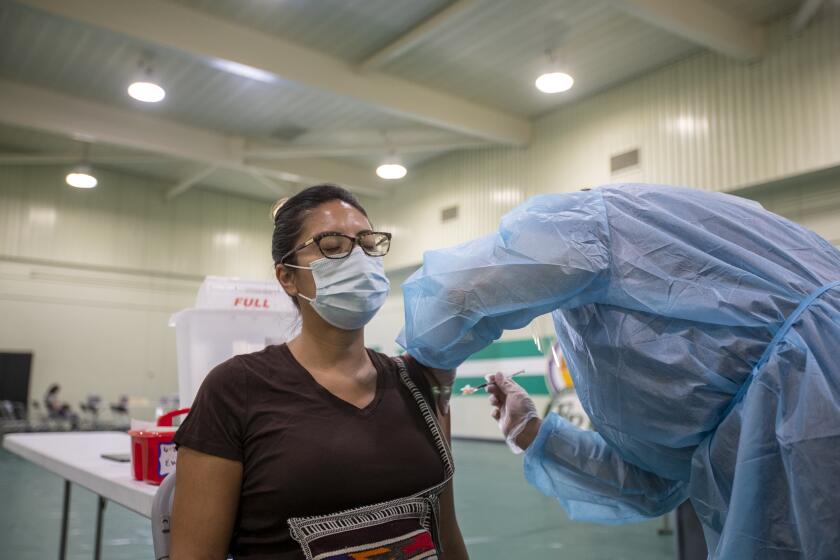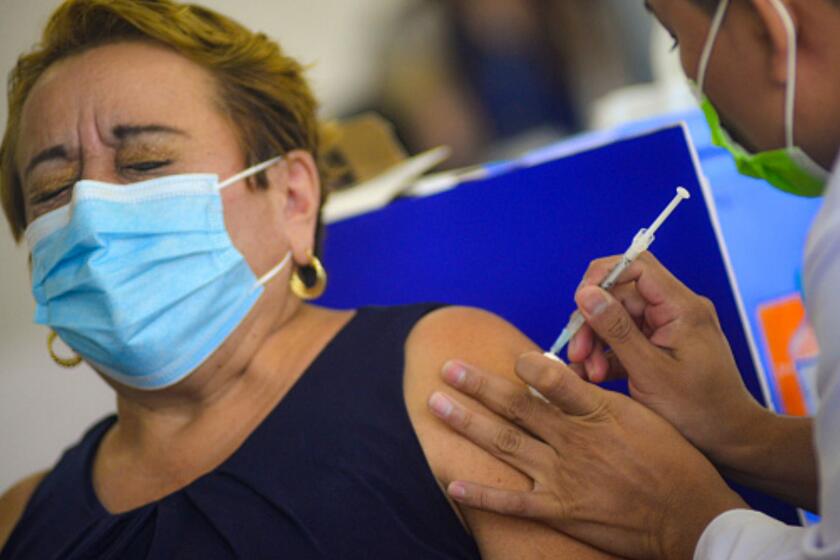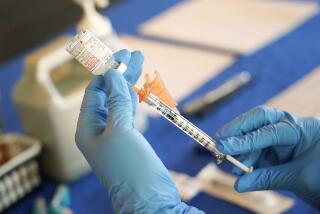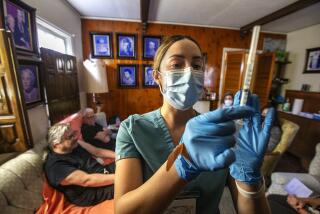Protection offered by booster shot beats ‘natural immunity,’ study suggests
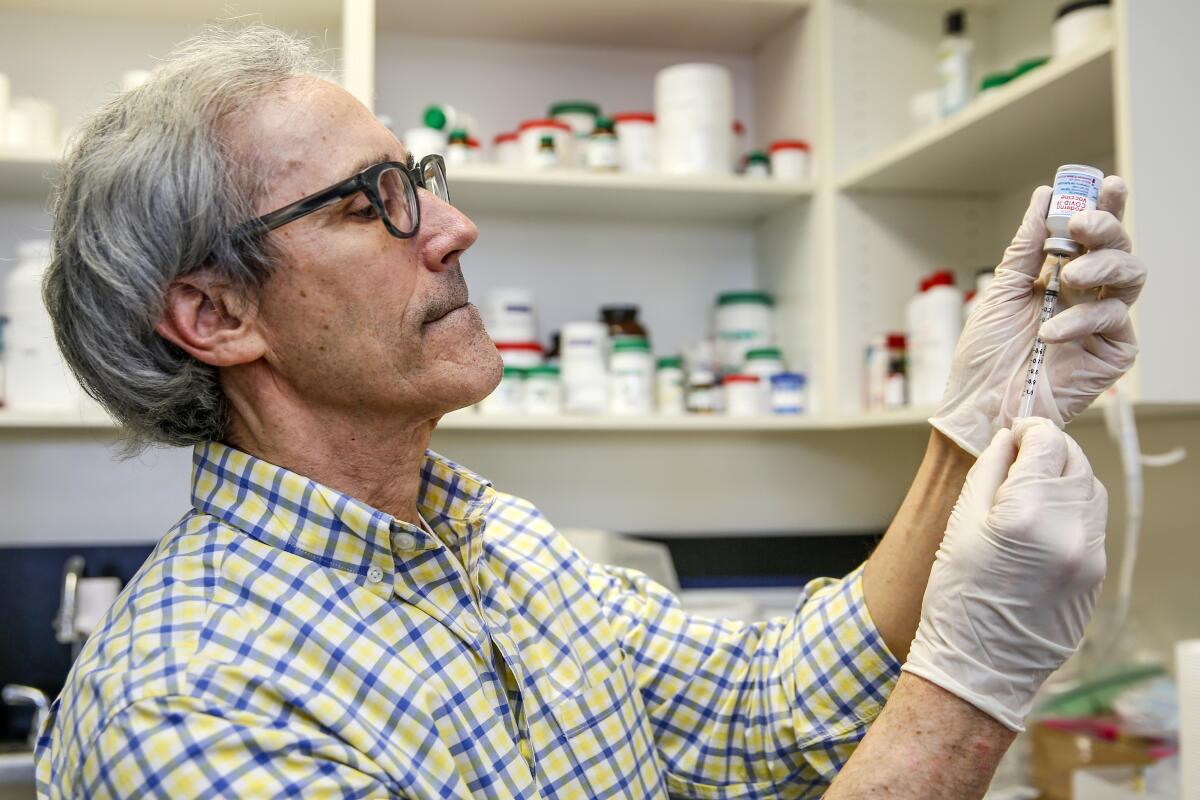
- Share via
Public health officials have been struggling to persuade eligible Americans to get their COVID-19 booster shots. New research could help them make the case that the extra dose will provide substantially more protection — even if they’ve also recovered from a coronavirus infection.
A small study that’s among the first to track people’s protective antibodies over time found that those who were immunized against COVID-19 with two doses of an mRNA vaccine and received a booster shot about eight months later saw their levels of neutralizing antibodies skyrocket.
Among this group of 33 fully vaccinated and boosted people, the median level of these antibodies was 23 times higher one week after the booster shot than it had been just before the tune-up dose.
What’s more, their median post-booster antibody level was three times higher than was typical for another group of people whose antibodies were measured a few weeks after getting their second dose of vaccine, when they’re close to their peak. And it was 53 times higher than that of a group of 76 unvaccinated people who had recovered from COVID-19 just two to six weeks earlier.
Even compared to a group of 73 people who had weathered a bout with COVID-19and went on to get two doses of an mRNA vaccine, the boosted group’s median antibody level was 68% higher.
Study leader Alexis Demonbreun, a cell biologist at Northwestern University’s Feinberg School of Medicine, said the data demonstrate that no matter how well protected a vaccinated person may think she is, getting a booster shot is likely to increase her neutralizing antibodies — and with it, her immunity — considerably. And because scientists expect large antibody responses to create more durable immunity, the protection afforded by the booster should last longer than the initial two-shot regimen did.
“If I was going to Vegas, I’d bet on the booster rather than getting the virus to protect me,” Demonbreun said.
Experts at the Centers for Disease Control and Prevention have set aside herd immunity as a national target for ending the pandemic.
The study was posted on MedRxiv, a website where researchers share preliminary findings.
The authors measured antibodies that lock onto a key component of the coronavirus spike protein called the receptor-binding domain, which the virus relies on to latch onto a host cell and force its way inside. In tests, they confirmed these antibodies were capable of keeping the virus out of the specific cells it attempts to invade.
While only 33 people were tested before and after getting a booster, their post-boost antibodies were compared to those of 941 people whose levels had been tested already. Everyone who was vaccinated had received one of the mRNA options, made either by Pfizer and BioNTech or Moderna.
The resulting group of nearly 1,000 subjects allowed the study’s authors to measure and compare immunity in people who had earned their protection in a variety of ways. (Among their other findings: After receiving two doses of vaccine, people who’d already had an asymptomatic infection were typically no better protected than vaccinated people who had never been infected.)
For the vaccine “passports” used across Europe and in Britain, people who’ve had a confirmed coronavirus infection are considered immune on a par with fully vaccinated people. Medical and public health leaders there also widely credit a second infection as a booster.
Those views have not prevailed in the U.S. Health officials here have said repeatedly that neither two doses of vaccine nor a past infection is likely to provide powerful long-term protection. Dr. Rochelle Walensky, director of the Centers for Disease Control and Prevention, has said a booster dose will probably be necessary to protect most.
While boosters have been extensively studied in older and immunocompromised people, the new work measured neutralizing antibodies in healthy adults from the Chicago metropolitan area, half of whom were 43 or younger. Participants were asked to prick their fingers and send in samples of their dried blood for analysis.
A study of 780,000 veterans shows a dramatic decline in effectiveness for all three COVID-19 vaccines in use in the U.S.
Dr. Greg Poland, a vaccine expert at the Mayo Clinic, said the new study provides “another dot” on the emerging picture of coronavirus immunity. Research on the crucial question of how best to protect humans has been hampered by the fact that no single measure fully captures the immune system’s multi-layered response, he said.
Antibodies are wildly diverse, and not all are capable of “neutralizing” an invading virus. Over time, they decay and disappear, leaving a more complex network of B cells and T cells to recognize and respond to a viral invasion. Yet scientists focus on antibodies because they’re the most visible and readily measured marker of immunity, though they may not be the best predictor of protection, Poland said.
The result is that research to date has yielded conflicting signals on the comparative value of vaccines versus infections.
An Israeli study posted to MedRxiv in August suggested powerful protection from a past bout with the coronavirus. It found that people with so-called natural immunity were 13 times less likely to experience a new infection than were people who hadn’t been infected and had two doses of Pfizer-BioNTech vaccine.
In October, a study published in Nature showed that while two doses of vaccine generated impressive antibody levels, people who’d been infected before they were vaccinated developed a more broad-based immunity that was better able to thwart infections involving new variants, such as Delta.
Alice Cho, a Rockefeller University scientist who led that research, said the new study doesn’t shed light on whether a booster shot can prompt the immune system’s B cells to recognize a wider range of coronavirus variants. But she said the body’s reaction to boosters was certainly encouraging.
“They are clearly very good at providing robust plasma antibody responses in people regardless of infection history,” Cho said.
